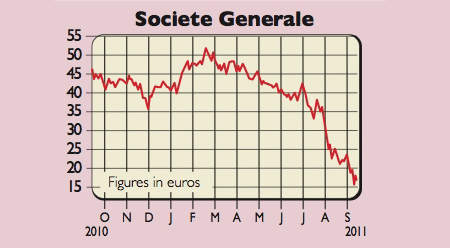
The spotlight fell on French banks this week. On Wednesday, ratings agency Moody’s cut the credit ratings of France’s Crédit Agricole and Société Générale and threatened to do the same to BNP Paribas, France’s biggest bank. French banks’ share prices fell earlier in the week, partly on fears of a downgrade. On Monday Société Générale’s stock plummeted by 11%.
Greece appeared ever more likely to default and Italy was forced to pay the highest interest rates on a five-year bond issue since it joined the euro. The sense of drift among policymakers was reinforced by German chancellor Angela Merkel. She said Europe was doing its utmost to avoid a Greek default – a few days after one of her ministers openly broached the idea of an orderly default as a way out of the crisis.
What the commentators said
The key problems with French banks is their exposure to Greece and how they raise funds, noted Jill Treanor in The Guardian. They hold $56.7bn of public and private Greek debt, more than other European banks. And “their wholesale funding mix is skewed to the short term”, said Barclays Capital. This is bad news, given the squeeze in the short-term wholesale market. American money-market funds rattled by the debt crisis are retreating, said Nelson D Schwartz in The New York Times. In August, money-market funds and other short-term credit providers opted not to refinance $50bn of European banking debt.
Meanwhile, the gap between three-month European interbank rates and German bunds is at its widest since early 2009. “Even European banks don’t trust each other any more,” said Kash Mansori of Experis Finance. “It’s similar to the distrust that happened worldwide in 2008.” In the interbank market, added Lex in the FT, it creates “a self-fulfilling prophecy; it starves banks of funds”. This undermines growth by squeezing credit.
The worsening banking situation is due to fears that a Greek default is looming. It will run out of money in a few weeks’ time if it doesn’t get its next tranche of EU/IMF aid soon; the payment has been delayed because it has made no progress on its austerity plans. The second Greek bail-out package is still far from being ratified by all eurozone member states. A Greek default could easily spread across the periphery. Policymakers, said Charlemagne on Economist.com, appear to be “out of ammunition and ideas”. Indeed, “the sense of impending disaster”, said David Blackburn on Spectator.co.uk, “is very real”.